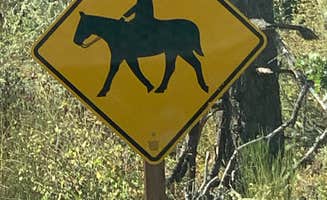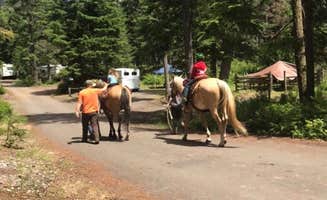Equestrian campgrounds near Stevenson, Washington offer access to over 200 miles of forest riding trails. The surrounding area sits at elevations between 1,500-4,000 feet, creating varied terrain for both horses and riders. Several dedicated horse camps provide direct trail connections, with trail conditions generally best from May through September when snow has melted and before fall rains begin.
What to do
Ride the PCT trails: From Panther Creek Campground, access sections of the Pacific Crest Trail with excellent views. "The PCT was a great for day hikes. Still pretty cold to swim in. River was easy to talk to for fishing," notes Heather P. The trails connect directly to the campground for convenient access.
Explore disc golf courses: Milo McIver State Park Campground features extensive disc golf facilities just a drive from Stevenson. "Milo McIver may be best known for it's twin 18 hole disc golf courses, or single 27 hole layout when tournaments aren't in progress," explains Steve C. These courses attract competitive players throughout the season.
Kayak on no-motor lakes: Several small lakes near horse camps limit motorized boats, creating calm paddling environments. "Great for paddle boarding or kayaking. There's a boat launch. Best of all, it's free!" reports Kathy B. about the waterways. Many riders appreciate the option for water activities on rest days.
What campers like
Natural surroundings: Cultus Creek Campground offers remote camping with minimal development. "Gorgeous views all around, undisturbed tent camping. I love it here and camp here often, even though it's 2 hours from me," shares Amelia L. The undeveloped setting appeals to horse campers seeking natural environments.
Private campsites: Many horse campers appreciate the space between sites at regional campgrounds. "This is hands down one of my favorite campgrounds, because the spots are large, far apart from the other sites, and very quiet," writes Ashley B. about Riley Horse Campground. The horse pens provide additional structure and space.
Water features: Streams and lakes near most horse camps provide both drinking water for horses and recreation for riders. "Close to Panther Creek for swimming on a hot day, taking off to the PCT for a hike, or foraging for mushrooms in the fall. Water sources and restrooms are such a luxury out here," notes Candace about water access during rides.
What you should know
Limited facilities: Most equestrian campgrounds provide basic amenities focused on horse needs. "A little more remote and in the 'semi-primitive' category, adding to a more natural feel," explains Bjorn S. about Knebal Springs. Bring all necessary supplies for both yourself and your horse.
Trail conditions vary: While most trails remain accessible during summer months, early and late season conditions can change rapidly. "The campground typically operates seasonally, with best riding conditions from late spring through early fall when trails are dry and accessible," explains one rider. Spring muddy conditions can damage trails.
Reservation requirements: Some horse campgrounds fill quickly during peak summer weekends. "Sites are first-come, first-served, and even on Memorial Day weekend there were several still available at 5pm on Sunday. Not sure if that was a fluke or we just got lucky," reports Corinna B. about regional camping availability. Always check reservation requirements before traveling with horses.
Tips for camping with families
Choose camps with multiple activities: Battle Ground Lake State Park Campground offers both horse and family-friendly amenities. "They have a cool volcanic lake with a swimming area and great fishing. Its like a mini crater lake. I mean mini like pond size," explains Ashley Y. Kids can alternate between riding and swimming.
Look for educational opportunities: Several campgrounds feature interpretive trails explaining forest ecology. "Part of our discovery was while we were there is that the food place is really good and very nice. The kids playground was great for the grandkids," shares Richard B. about nearby amenities that enhance family visits.
Plan for weather variables: Summer temperatures can vary widely at different elevations. "It was very hot over July 4th. You can't get to Cherokee lake from the campground. very clean and nice. Visit the camp station area birds on display," advises Malinda C. Bring layers for cooler evenings even during summer months.
Tips from RVers
Size restrictions: Most dedicated horse campgrounds limit RV length due to tight turning areas. "This campground has lots of tent sites, and some cabins," explains Wendy C., noting the limited large vehicle access at many forest service camps. Check maximum vehicle lengths before attempting access with horse trailers.
Water and dump stations: Full-service options remain limited at most equestrian sites. "Larger rig owners appreciate the pull-through sites with hookups available at selected campgrounds near Stevenson," notes one experienced RVer. Consider utilizing full-hookup sites at lowland campgrounds between horse camping trips to refresh tanks and systems.



